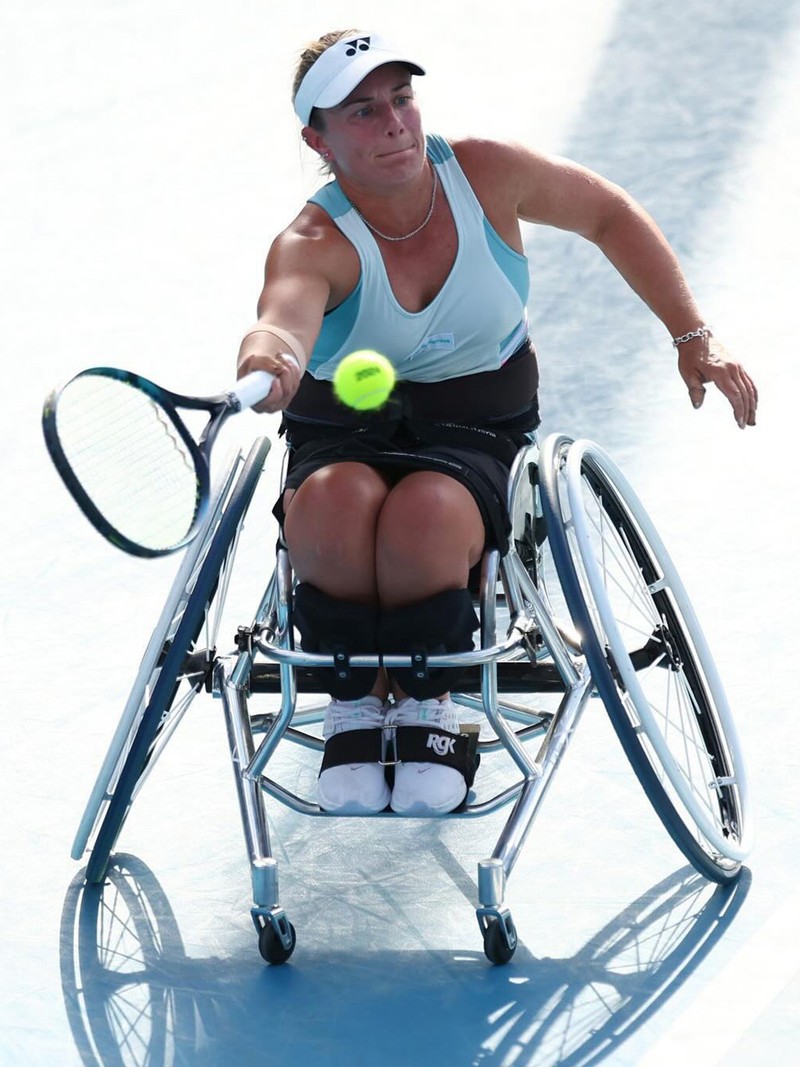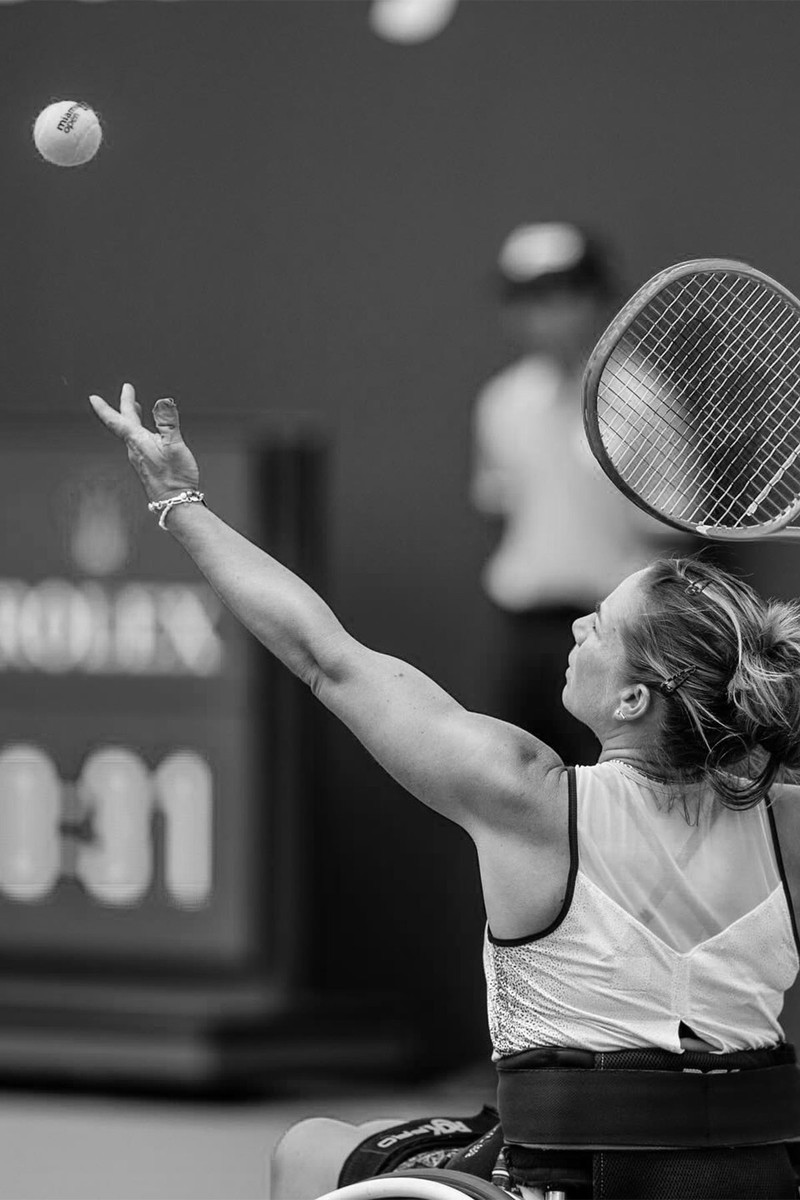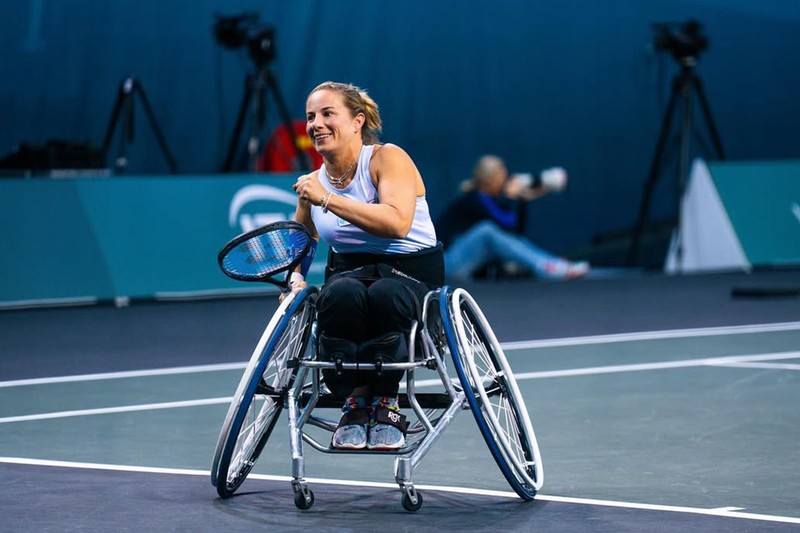
The Business Edition Meets British No. 1 Lucy Shuker
When I was young, badminton ran in our family. My parents played, my uncle played, my older brother played… so, naturally, I followed suit. I also loved horse riding, even though I maybe took it for granted a bit at the time. My parents were big advocates for sport and by the time I was 16, I was playing county-level badminton. I’d never played tennis – except for at school or now and again in the local park.
I don't remember much about the accident. I’d been driving since I was 17, so I understood the roads and potential dangers, but I was 21 and newly passed on a motorbike licence. I went out with a friend of mine – he was on his bike, I was on mine – and on the way back on a country road, I misjudged a corner. I hit a telegraph pole and post box that were side by side. If I'd have been a metre either side, I'd probably just have had a bit of a skin burn but unfortunately that's not what happened.
The only memory I have is lying at the side of the road. There was mud up in my visor and I remember saying to my friend that I couldn't feel my legs. I went to hospital and was adamant I would walk out of there, but it wasn't until I saw the MRI scan that I realised that that wasn't going to happen. The scan showed that I'd severed my spinal cord. I was in the hospital for ten months and it was a tough time. You lose your identity, you lose your self-confidence – suddenly, you’re no longer who you used to be. I saw myself differently and worried about other people seeing me differently too.
Meeting Peter Norfolk changed my life. At the time, he was the number one British wheelchair tennis player in the quad division. He had a disability company, and I was buying my first wheelchair from them. I went to be measured up and in conversation, I mentioned I played badminton before my accident. He was the one who suggested trying tennis – in his showroom he had pictures of him playing at Grand Slams and Paralympics. So, I tried it. He lent me one of his old tennis chairs and I started by playing for fun. It helped me get stronger and accept my disability.
Playing tennis also allowed me to meet other people. It wasn't just that I needed to meet other people in a wheelchair, it was about finding a sport I enjoyed and could play with my friends and family, so I felt included. Nowadays I very much embrace everyone's differences, but it taught me that just because people have a disability, it doesn't mean that they can't live a fulfilled life. We all struggle at times but what counts is how you respond and react to those challenges. If you get knocked down, you get back up and find the answers with the help of your loved ones or professional help as well.
My tennis career has lasted over 20 years, but it’s really been a case of living day to day. It’s been a journey of constant readjustment. The best thing about wheelchair tennis is that a lot of people have a story. So, whether it's an accident or a disability from birth, there's a reason why they've come to the sport. It's not to say that we're any less of an athlete. We all train, and some of us have more challenges that we have to overcome each day. Life on the tennis tour can sometimes come across quite glamorous, but there are plenty of tough and lonely times. You have to surround yourself with a team that you trust and support. I'm lucky that my other half travels with me because in tennis, there are a lot more losers than there are winners. But there’s something about hitting or chasing a tennis ball around the court that I love. It’s given me amazing experiences like going to the Paralympics and all the Grand Slam tournaments.
You have to take the losses as learning opportunities to do better the next time. Losing in nine Grand Slam doubles finals – including in a tie break at Wimbledon – was tough, as was getting to the Paralympic final in Tokyo and losing the gold medal. Sure, you've won a silver but you've lost a gold. All you can do is take a step back and realise that not many people in the world are in that position at all. I have been very fortunate to have been in those positions and I'm doing what I love.
I’ll never forget the bronze medal match at the London 2012 games. We had a packed stadium, people queuing to get in and my family were there. Not many Paralympians get to experience home games – it’s one of the best memories I have.
It is so important that people take the time to have conversations, share articles and talk to athletes to increase awareness of disability sport. We don't just compete once every four years – we're competing numerous times during each year, trying to qualify for Paralympics or Grand Slams. We’re all striving to be our best at. Sharing people's stories makes us relatable because we are not super humans – I'm just Lucy but I'm also incredibly privileged to play a sport that I absolutely love.
For me, the hard court is the easiest surface to play on. My disability is less pronounced on a hard court. On a grass court, like at Wimbledon, I feel far more vulnerable because I feel slower. But it's still incredible to be there. Everyone around the world knows about Wimbledon, so to have been one of the small number of people to compete there is awesome.
The preparation for a match starts days beforehand. You want to be fuelling correctly, sleeping correctly, packing your bag the night before so you've got your racket, nutrition and gels sorted. On the day, you prepare with your warm-up equipment – bands, medicine balls – focusing on shoulders, arms, upper body. Then you have your warm-up on court, fuel a little bit and then play. In singles, you might have to fuel again, ready for your doubles. You might have two matches in a day, possibly up to three. I love doubles because I love working with somebody. I enjoy the different dynamic, being able to come to the net more often, trying out lobs, using more angles. People say I have good hands, so I love doubles.
Every tournament is an opportunity to improve your ranking. That really motivates me – looking within my game, working on certain aspects of it. Those competitions are then a time to measure how much you’ve improved – or not if you haven't got the results you're after. Then it’s about sitting down with your team to discuss what did and didn't work. Sometimes you’ll be targeting a higher-level tournament and sometimes it might be a slightly lower-ranked tournament to build a bit more confidence or work on certain aspects of your game. It's about juggling downtime as well, because you can't just keep going all the time. Tennis is quite a brutal sport and it's so busy. We’re still humans at the end of the day, and we still need time to decompress.
If I could talk to 21-year-old Lucy in hospital, I'd want to reassure her. At that moment, things were scary and the uncertainty of who I was and how life was going to be felt overwhelming. I'd tell her to embrace the journey, the opportunities and the challenges. I’d be kinder to myself because I think we're always striving for perfection. But it's very rare that perfection exists. I’d also continue to surround myself with good people because they're the ones that have your back. They're the ones who pick you up and put you back together again. You can trust those people day in, day out, no matter the results. When tennis finishes, they're the ones that will still be there at the end of the day.
Follow @LUCY_SHUKER
DISCLAIMER: We endeavour to always credit the correct original source of every image we use. If you think a credit may be incorrect, please contact us at info@sheerluxe.com.


/https%3A%2F%2Fsheerluxe.com%2Fsites%2Fsheerluxe%2Ffiles%2Farticles%2F2025%2F06%2F2919539655745634208583918624604288512351210n.jpg?itok=9qiweBh-)

